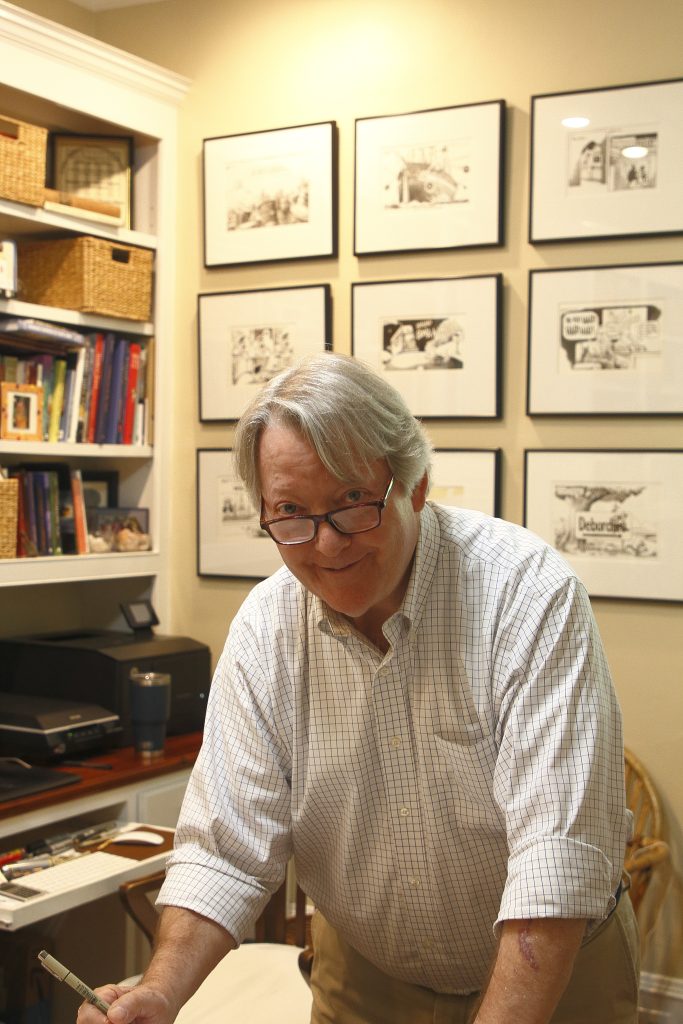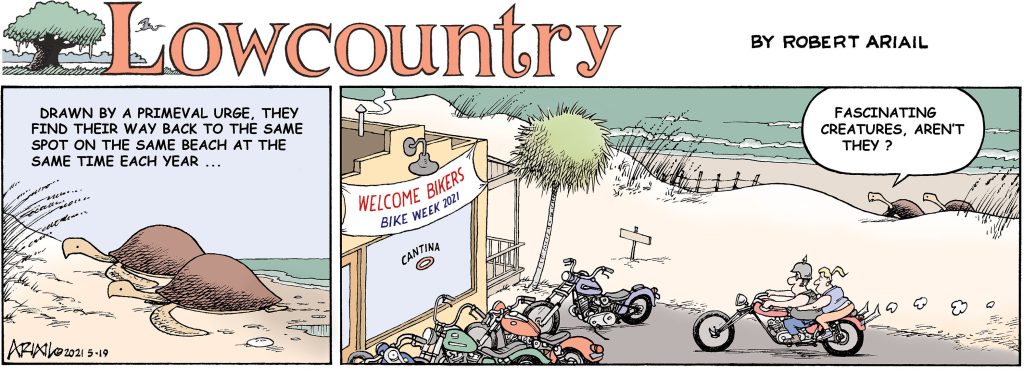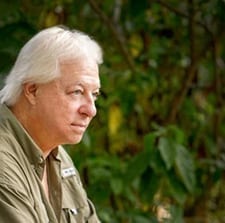Robert Ariail, Cartoonist
August 21, 2024By Tom Poland
In the beginning, there was the urge to draw—and inspiration, Saturday morning cartoons.
“I’d drawn since I was a boy, spending hours with crayons, pencils, manila paper, and an Etch A Sketch to render dinosaurs and other creatures. In junior high, political cartoons resonated with me and I remember drawing humorous illustrations in my 7th– and 8th– grade art classes.”

Robert Ariail
By high school Robert Ariail was the school paper cartoonist, inspired by his 10th grade English teacher who introduced him to Pat Oliphant and other notable artists. The principal canned his first cartoon. “My first taste of the editor/cartoonist relationship,” said Ariail. He landed his first job with The State the month he graduated from the University of South Carolina, just the second cartoonist in The State’s history.
Editorial cartooning, like jazz, is an American art form, and Robert Ariail is an artist. His studio brims with the tools of creativity: pens, an iMac, paper, and drawing table. A handsome carving of an eastern brown pelican overlooked sketches as Ariail sat at his iMac. On it a “Lowcountry” cartoon depicted a raccoon and turtle baking beneath the Carolina sun, braving rain, then freezing. Fourth frame—the turtle speaks. “Nothing like springtime in South Carolina.”
Political cartoons, on the other hand, stir emotions. When Ariail worked for The State, his phone rang a lot. “I had to listen to angry readers. I got positive feedback as well, which is always very gratifying. I least enjoyed the withering, mean-spirited, downright vicious online criticism that’s most often anonymous.”

He maintained a website of cartoons, mostly for archival purposes, where people could comment. “One cartoon brought in over 10,000 comments so threatening and vicious I had to stop reading after the first page. Soon after, I pulled the plug on the site.”
The Great Recession of 2009 brought change to newspapers nationwide. The convergence of the internet, social media, and hard economic times turned print journalism upside down. Newspapers began mass layoffs. Most newspaper cartoonists lost their jobs within a few years.
“I was pushed out in 2009,” said Ariail.
After leaving The State he looked for a staff position at other newspapers. Nothing. “I landed a contract gig with the Spartanburg Herald-Journal and later the Memphis Commercial Appeal. Each gig lasted about three years until the same cost-cutting newspaper chain bought the papers.”
The three-time finalist for The Pulitzer Prizes kept on keeping on, and today the Andrews McMeel syndicate distributes his work to over 600 newspapers. “Having my work published in papers all over the country (except my home town), I don’t get much feedback, negative or positive, which is kind of liberating.”
For 40 years now Ariail’s been making people think. His cartoons have won international, national, regional, and state awards. Among them, the National Association of Alternative Newsmedia Award, the National Press Foundation’s Berryman Award, the United Nations Ranan Lurie Award, and the Elizabeth O’Neill Verner Governor’s Award for the Arts. Not bad for a fellow who started out with crayons, manila paper, and an Etch A Sketch.
“While there’s much to lampoon with what’s going on in Washington and here in our Statehouse, I find myself longing to explore other art forms,” said Ariail. “In the last few years I’ve started to paint again after a 35-year hiatus. I’m enjoying it so much I’m about ready to trade in my ink pens for hog hair and sable brushes.”
I had one last question. “Do you hear from people you parody?”
“I do, politicians, mostly. Most all want the original or a copy for their office walls, even when it’s not too flattering. Funny how that works.”
Note: Ariail, a Columbia, S.C., native and University of South Carolina graduate, received the Distinguished Alumnus Award from USC in 1985. His one-man show at the Koger Center Art Gallery in Columbia opens September 23 and runs until November 17th.
Georgia native Tom Poland writes a weekly column about the South, its people, traditions, lifestyle, and culture and speaks frequently to groups in the South. Governor Henry McMaster conferred the Order of the Palmetto upon Tom, South Carolina’s highest civilian honor, stating, “His work is exceptional to the state.” Poland’s work appears in books, magazines, journals, and newspapers throughout the South.
Visit Tom’s website at www.tompoland.net
Email him at [email protected]




















